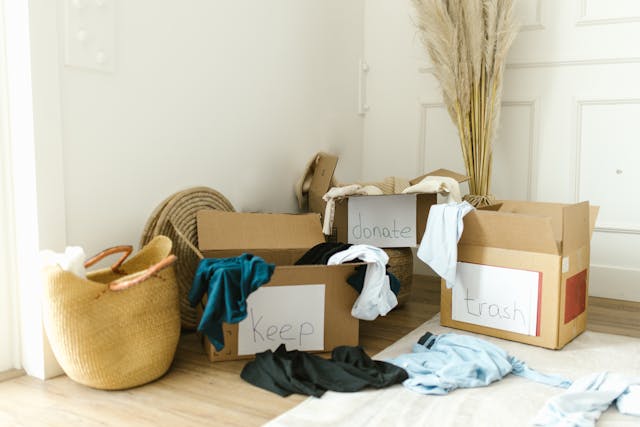145 First-Step Decluttering Tips for Seniors
Decluttering doesn’t have to be hard! Try these 145 simple first-step decluttering tips for seniors to help create a safer, stress-free home.
MOVING & HOME TIPS
2/22/20256 min read
Seniors, Ready to Declutter Your Space? Try These Tips!
You open a closet to grab something, but instead, you’re met with a pile of items you haven’t used in years. Sound familiar? Over time, belongings add up and fill drawers, shelves, and entire rooms to the brim.
Of course, letting go is difficult, particularly so for seniors who have spent a lifetime collecting memories through objects. Every item might feel connected to a special moment, a loved one, or a "just in case" scenario. This emotional attachment, combined with the thought of sorting through everything, does make decluttering quite overwhelming.
First-step decluttering means taking baby steps instead of trying to tackle an entire home at once. These simple actions create progress without any physical and emotional pressure.
Keep in mind that a clutter-free home not only makes daily life more manageable but also reduces stress and helps prevent safety hazards like trips and falls for seniors. Letting go of what’s no longer needed makes space for the things that truly matter.
This guide provides 145 first-step decluttering tips designed to help seniors take that first step toward a more organized and peaceful home.
From clearing out expired medications to sorting sentimental keepsakes, these practical ideas will make it much easier to part with items gradually and place the ones previously strewn about in their rightful space.
Focus & Mindset
Start with a small space (a drawer, not a whole room).
Don't get bogged down in sentimentality. Set time limits (10-15 minutes) for reminiscing.
Better yet, tackle sentimental items last.
Focus on one category at a time (clothes, books, kitchenware, etc.).
Use the “one in, one out” rule to prevent clutter buildup.
Set realistic decluttering goals.
Take “before” and “after” pictures for motivation.
Ask a family member or friend to help for support.
Make decluttering a routine, not a one-time event.
Imagine how your home should feel, not just look.
Think of others. Donating items can help those in need.
Focus on safety. Remove tripping hazards and create clear pathways.
Ask yourself: What areas are most important to declutter first?
Label things as “Keep,” “Donate,” “Trash,” or “Unsure.”
Start with the easiest decisions first (expired items, broken things).
Set a reward for decluttering progress (favorite meal, relaxing time).
Decluttering can be physically and emotionally draining. Take regular breaks.
Listen to podcasts to make the process more enjoyable.
Don't compare yourself to others. Everyone's decluttering journey is unique.
Remember your "why": Why are you decluttering? Keep this in mind.
Paper & Documents
Shred outdated bank statements, bills, junk mail, etc.
Save important documents on a computer or external drive.
Create a filing system for essential papers.
Cancel unwanted subscriptions.
Go paperless whenever possible. Opt for online billing and statements.
Limit incoming mail. Use a "no junk mail" sticker.
Sort through old letters and cards. Keep the meaningful ones, discard the rest.
Review insurance policies. Make sure you have the right coverage.
Keep your medical records together in a single file.
Keep important phone numbers and addresses readily available.
Remove unnecessary items and organize supplies from your desk.
Scan old photos and create digital albums.
Back up important files. Make sure you have soft copies of essential documents.
Create a password log to keep track of your online passwords.
Review and organize all financial documents (bank statements, investment reports, etc.)
Close unused bank accounts or credit cards.
Organize warranties and instruction manuals at a designated place.
Create a home inventory. Document your belongings for insurance purposes.
Review legal documents (wills, power of attorney, etc.)
Shred sensitive information. Protect yourself from identity theft.
Use a document scanner app to quickly digitize paper documents.
Organize receipts. Keep only the necessary ones for taxes or warranties.
Unsubscribe from unwanted email lists.
Create a "to-do" list to stay on top of tasks and appointments.
Set aside time each week to deal with incoming mail.
Clothing & Accessories
Sort through your wardrobe. Identify items you no longer wear or need.
Donate clothes in good condition to charity or a thrift store.
Discard worn-out or damaged clothing. Don't keep items you can't wear.
Try on clothes to see which ones still fit comfortably.
Be honest with yourself: Do you really wear that item?
Consider the "one year rule": If you haven't worn it in a year, let it go.
Organize your closet. Group similar items together.
Use matching hangers to create a more uniform look.
Store out-of-season clothing. Pack them away neatly.
Declutter accessories (jewelry, scarves, hats, etc.)
Repair or alter clothes. Fix minor tears or adjust the fit.
Invest in a few high-quality pieces, instead of many cheap items.
Create a capsule wardrobe with a limited number of versatile pieces.
Donate or sell unwanted shoes.
Fold clothes neatly to maximize space.
Remove broken or unwanted pieces in your jewelry box.
Store jewelry properly to prevent tangling and damage.
Get rid of handbags and purses you haven’t used in a long time.
Declutter your belts and scarves. Keep only the ones you wear.
Consider the fit and style: Is the clothing flattering and comfortable?
Think about your lifestyle: Do your clothes reflect your current activities?
Don't keep items that don't make you feel good.
Discard worn-out or mismatched socks and undergarments.
Wash or dry clean clothes before donating. Ensure they are in good condition.
Thank your clothes for their service. This will make it easier to let go.
Kitchen & Pantry
Check expiration dates. Discard outdated food items.
Clean out your refrigerator and freezer. Remove old or spoiled food.
Group similar items together.
Get rid of duplicates or rarely used items.
Donate or sell unwanted kitchen appliances, if they are still in good working order.
Hang pots and pans or use drawer organizers.
Discard chipped or broken dishes and glassware.
Use a utensil holder or drawer dividers to organize your utensils.
Keep only the cookbooks you use regularly.
Discard outdated spices. Arrange the rest alphabetically or according to use.
Clean out your cabinets.
Declutter your food storage containers. Discard lids that don't match.
Install a set of Lazy Susan cabinet trays to organize baking utensils and supplies.
Declutter your kitchen linens (towels, tablecloths, etc.)
Clean your oven and stove top. Remove built-up grease and grime.
Use kitchen drawer organizers to make the most of the space available.
Declutter your mugs and cups. Keep only the ones you use regularly.
Use clear containers to see what you have on the shelves.
Remove unnecessary items from your kitchen counters and keep them clean.
Create a binder or digital file for your recipe collection.
Donate or sell unwanted kitchen furniture.
Clean your microwave. Remove food splatters and spills.
Keep your cleaning supplies in one place within reach.
Declutter your reusable bags. Keep only the ones you need.
Clean out your garbage disposal. Remove food debris and odors.
Bathroom & Personal Care
Discard expired toiletries (makeup, skincare products, etc.)
Remove outdated or unused medications from your medicine cabinet.
Purge your bathroom drawers of anything you don’t need or won’t use.
Clear out your shower and bath area. Remove empty bottles and unnecessary items.
Organize your toiletries. Keep them in one place for easy access.
Declutter your hair styling tools. Get rid of broken or unused items.
Fold your towels neatly and store them in a designated place.
Clean or replace your makeup brushes and applicators regularly.
Keep your personal care items in one place.
Remove unnecessary items from your bathroom counters and keep them clean.
Use baskets or containers to store items.
Declutter your travel-sized toiletries. Discard empty or expired items.
Keep all your dental care items in one place.
Replace expired items from your first-aid kit and restock as needed.
Keep your feminine hygiene products at hand.
Discard worn-out bathrobes and slippers
Store your hair accessories in a designated container or drawer.
Discard old nail polish or tools.
Keep your contact lenses and solution in a bathroom cabinet.
Discard old or unused fragrances.
Keep all your bathroom cleaning supplies in one place within reach.
Discard old or broken bath toys.
Wash your bathroom rugs and mats or replace them as needed.
Clean or replace your shower curtain and door as needed.
Ensure adequate bathroom lighting for safety.
Living Areas & Bedrooms
Donate or sell unwanted books.
Discard old magazines and newspapers.
Declutter your decorative items. Keep only the ones you love.
Create photo albums or digital folders.
Declutter your artwork. Keep only the pieces that bring you joy.
Arrange your furniture for optimal flow and safety.
Declutter your throw pillows and blankets. Keep only the ones you use.
Keep all your remote controls in a designated place.
Donate or recycle old devices.
Use cable organizers to prevent tangling of cords and cables.
Declutter your lamps and lighting fixtures.
Clean or replace your window treatments as needed.
Declutter your collections (if applicable).
Use clear bins and labels to organize your storage areas.
Keep hobbies and crafts supplies in their designated containers.
Donate or sell unwanted games and puzzles.
Remove unwanted items from your attic or basement and organize the rest.
Keep your garage tools and equipment upright.
Discard broken holiday decorations.
Keep your gift wrapping supplies.
Keep only the most meaningful travel souvenirs.
Create a memory box or scrapbook for your keepsakes and mementos.
Discard old pet supplies and donate unused ones.
Repot or prune your plants as needed.
Put things back where they belong.


Explore
Welcome to Stay Curious – the blog where questions never get old and answers are always a little bit unexpected. Here, we challenge the status quo, dig into the weird and wonderful, and offer insights that might just make you think, “Why didn’t I know this sooner?”
From quirky facts to deep dives into the everyday mysteries of life, we’re all about satisfying that itch for knowledge you didn’t even know you had.
So, go ahead—stay curious. We promise it’ll be worth your while. Or, you know, not.
Contribute
Learn
ask.staycurious@gmail.com
© 2025. All rights reserved.
We welcome guest posts on business, tech, travel, finance, lifestyle, career, relocation, and home improvement. Submissions must be original, unpublished (online), at least 800 words, and written in English.
Ready to contribute? Contact us with your ideas!
